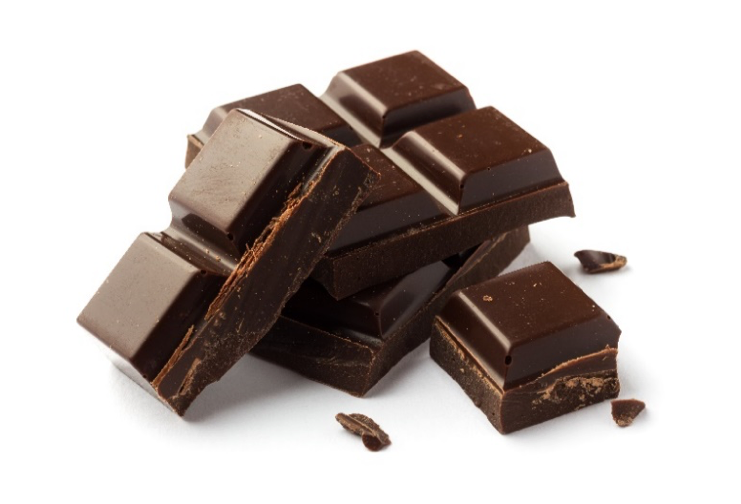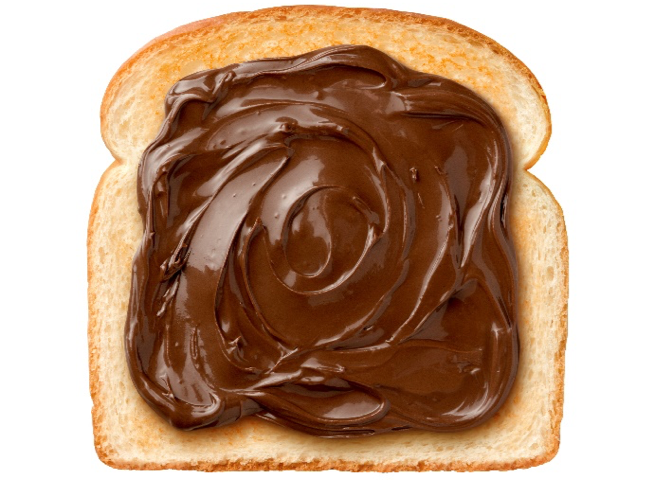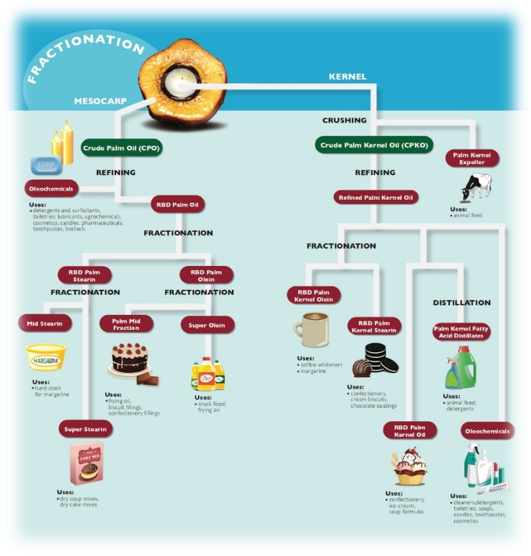Palm oil and chocolates – what’s the connection?
Palm oil is found in almost 50% of food products in the supermarket requiring a fat component. From chocolates to biscuits and peanut butter to ice-cream, palm oil in its various forms and derivatives are a common ingredient in these food products. This is probably the most used claim by campaigners against palm oil. In addition, palm oil is also used in the production of personal care products such as shampoo and toothpaste and in household cleaning products such as detergents and cleansers.

The Misinformation Plague about Palm Oil
Festive seasons such as Easter and Christmas are the periods where misinformation will be intensified to the uninformed consumers on the negative effects of palm oil towards health and environment. Most of these allegations are inaccurate. These allegations came in many forms which further confuses the consumer who is already juggling to look for more reliable and accurate information on palm oil. During Easter, eggs and bunnies are generally portrayed in the celebration, where these are crafted in the form of chocolates and candies.
Palm Oil in Chocolates
The global cocoa bean market size is projected to expand at 7.3% from 2019-2025. Europe and United States dominate the top 20 chocolate consuming countries where confectionery sales peak during Easter and Halloween. Beyond US and European consumption, the World Cocoa Foundation predicts the chocolate industry to grow substantially in China and India.
Cocoa butter is the largest product segment, accounted for more than 50% of global share compared to other cocoa products. Cocoa butter, a premium product is however lagging in production. Cocoa butter alternatives thus continue to be a key solution for long term profitable production. Cocoa butter alternatives are easily modified and cheaply produced while functionally able to mimic cocoa butter. Cocoa butter alternatives include:
 Projection of global cocoa bean market size expansion from 2019-2025
Projection of global cocoa bean market size expansion from 2019-2025

Europe dominates the top 20 chocolate consuming countries

Cocoa butter is the largest product segment compared to other cocoa products
Cocoa Butter Substitute (CBS), derived from palm kernel oil and coconut oil, which contain lauric acids are perfect alternatives. Even though these are not wholly compatible with cocoa butter, they can be mixed at lower percentages as substitutes.
Cocoa Butter Replacer (CBR), derived from non-lauric fats like palm oil, soybean oil, rapeseed oil and cottonseed oil can be partially compatible with cocoa butter.
Cocoa Butter Equivalent (CBE) which is more compatible, can be derived from shea, sal nut oil as well as palm oil, mango kernel fat and palm kernel oil.
| Cocoa butter alternatives | Derived from | Campatibility |
| Cocoa butter Substitutes (CBS) | Palm kernel oil, Coconut oil | Not wholly compatible but mixed at lower percentage |
| Cocoa Butter Replacer (CBR) | Palm oil, Soybean oil, Rapeseed oil, Cottonseed oil | Partially compatible |
| Cocoa Butter Equivalent (CBE) | Shea, Sal nut oil, Palm oil, Mango kernel fat, palm kernel oil | More compatible |
The biggest advantage of using palm fat as alternative is due to its availability and the potential cost reduction of the overall confectionery formulation. Cocoa butter has unique and sharp melting profile at 34⁰C (93⁰F). Palm based cocoa butter substitutes remain solid at room temperature but have similar melting characteristics like cocoa butter, which gives a smooth and creamy texture in the mouth, giving a similar experience using to that of cocoa butter.
Palm oil when used as cocoa butter alternatives, improves the finished products’ fat composition profile and stability
| Advantages of palm based cocoa butter alternatives |
|
|
|
|
|
Palm oil produced from the palm fruit is a natural, non-GMO oil which is semi solid at room temperature. Palm oil is extracted from the flesh of the fruit while palm kernel oil is obtained from the crushed oil palm seed.
Both palm oil and palm kernel oil have different and distinctive properties which make it extremely versatile and enable usage in different applications in food and non-food products. Palm oil and palm kernel oil can be refined and fractionated to produce various fractions with different properties.

Palm oil can be fractionated into palm olein which is the liquid fraction and high in monounsaturated oleic acid. This is the primary cooking oil used in tropical and sub-temperate regions of the world. On the other hand, palm stearin is the solid fraction from palm fruit oil and is trans-fat free which is widely used in bakery and confectionery.

Palm kernel oil also can be fractionated into palm kernel olein and palm kernel stearin. Palm kernel oil is used widely as coating fats, cocoa butter substitutes and toffee fats, while palm kernel olein and palm kernel stearin are used as confectionery
Palm oil is natural, non-GMO oil which is semi solid at room temperature
Anti-palm oil campaigns which are rampant especially in EU, promotes misinformation on palm oil and its products. However, palm oil is proven to be a versatile ingredient in many food products including chocolate due to its characteristics and economic advantages. Lobbying to avoid palm oil in confectionery would prove to be a wrong move.
Lobbying consumers to avoid palm oil and manufacturers to use other alternative oils will significantly increase the price of the end product, alter the end product properties and increase land used to grow these alternative edible oil crops.

Certified Sustainable Palm Oil for Chocolate and Confectionery
Certified sustainable palm oil is a growing positive trend and is adopted by various chocolate makers including Kinder, Ferrero, Mars and Nestle. Certified sustainable palm oil provides consumers with environmentally friendly and responsible options. Malaysian palm oil is certified by globally recognized certification schemes such as the Roundtable on Sustainable Palm Oil (RSPO) and the German ISCC using guidelines and criteria that were developed through expert consultations and include elements that addresses deforestation, habitat loss and social conflict.
Malaysian palm oil is also certified through the Malaysian Sustainable Palm Oil (MSPO), which is a national mandatory scheme.

The standard ensures mandatory compliance towards Malaysian laws and ratifies relevant international agreement and conventions. The standard also encompasses the 3 pillars of sustainability.
Palm oil is an important ingredient in chocolate and confectionery industry and an essential vegetable oil in ensuring global food security.
Palm oil is an important ingredient in chocolate and confectionery industry and an essential vegetable oil in ensuring global food security. Malaysian palm oil is produced sustainably and responsibly while complying with existing national regulations complemented with best practices and plantation management without neglecting the environment and its services.
Malaysian palm oil is important in supplying the world’s requirement for affordable oils and fats compared to other edible oils. Malaysia’s palm oil industry’s sustainability policy and certification system ensures the production and the availability of high quality palm oil in the global market.
Reference;
- Berger, Kurt G. (2010), Quality and Functions of Palm Oil in Food Applications – a Layman’s Guide. National Library of Malaysia.
- McBain D., Why Demand for Sustainable Palm Oil, http://otter.org.au/why-demand-sustainable-palm-oil/#sthash.IXsQcJnQ.dpuf
- Grand View Research, Cocoa Beans Market Size, Analysis, Global Industry Report, 2019-2025. http://www.grandviewresearch.com/industry-analysis/cocoa-beans-market.
- Jill Frank. (2014). Cocoa Butter Alternatives in Chocolate. Prospector. http://knowledge.ulprospector.com/1085/fbn-cocoa-butter-alternatives-chocolate/
- The Prospector Knowledge Centre, Fatty Acids Profile, http://www.uccs.edu/Documents/danderso/fats_oils.pdf
Prepared by: Anthony K.Veerayan

